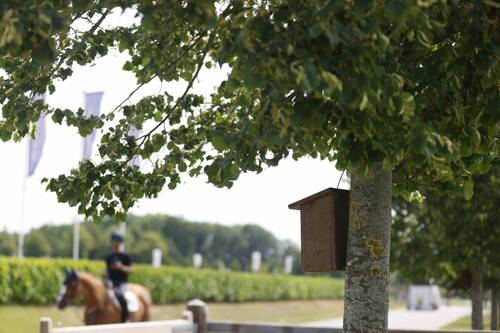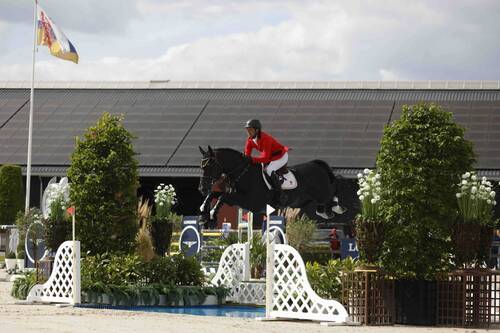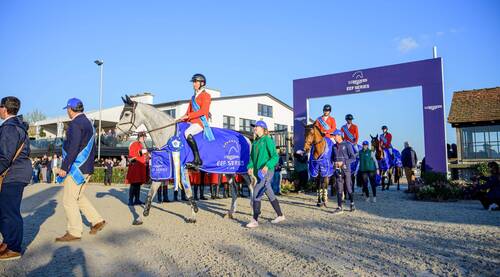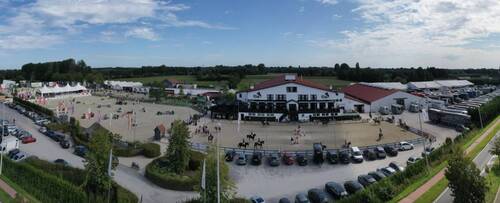Driving Sustainable Progress in Equestrian Sports: The EEF's Vision for the Future
21. Jul 2025 / Category: Press Release
Report: Eleanore Kelly
Can you picture a world where equestrian events serve as figure heads in terms of their environmental impact?
Well, the sky is the limit for the European Equestrian Federation (EEF). Sustainability is no longer a peripheral concern in global sporting events — it is a core commitment shaping the way organisations operate, and the EEF has made significant strides toward embedding sustainability into the heart of its initiatives. With the introduction of the Longines EEF Series (LES) Sustainability Survey and the proactive steps taken by several Organising Committees (OCs), the EEF is redefining what responsible event management looks like in equestrian sports.
A Structured Start: The LES Sustainability Survey
It was in 2023 that the EEF launched the LES Sustainability Survey, a pioneering initiative aligned with the EEF Green Code of Conduct. This survey represented the first coordinated effort to measure and evaluate the sustainability practices of Longines EEF Series (LES) events. It was not only a tool for data collection, but also a catalyst for change — encouraging OCs to reflect on their environmental impact and identify areas for improvement. Think of it as a gentle nudge to get everyone talking about their environmental impact.
The survey served as a foundation for developing sustainable frameworks, tracking progress, and holding stakeholders accountable. By initiating this process, the EEF took a decisive step toward institutionalising sustainability as a key component of LES event planning and execution. Sustainability was no longer a lofty goal — it was the agenda.
Building Momentum
The 2024 season brought encouraging participation, with nine out of eleven OCs submitting their sustainability surveys. While this highlights meaningful progress, Mannheim stood out for its exemplary approach. It became the first and only event to publish a comprehensive sustainability report aligned with selected Global Reporting Initiative (GRI) standards.
This move toward structured and transparent reporting sets a powerful precedent. Mannheim's initiative not only demonstrated accountability but also established a benchmark for future events. The report highlighted actionable data, offered clear insights into environmental practices, and emphasised a commitment to continuous improvement.
Acknowledging the Reporting Gap
Despite this progress, a two-year review uncovered a notable shortfall in consistent sustainability reporting across the series. While many OCs showed interest and intent, few had systems in place to translate good practices into structured reporting. You can have excellent eco-initiatives behind the scenes, but if nobody is keeping the score, does it even count?
To address this, the EEF developed an enhanced questionnaire for the 2025 LES events, designed not to simply tick the boxes but to gather the kind of meaningful data that fuels genuine improvement. The aim is to enable all OCs to produce comprehensive sustainability reports, setting the stage for greater transparency, data-driven decision-making, and long-term impact.
Monitoring and reporting are essential to ensuring that sustainability is not treated as a one-off project but as a continuous process of learning and development. The EEF's commitment to embedding this philosophy throughout the LES is evident in its revised approach.
Lier and Peelbergen Take the Lead
Aside from Mannheim, two other events have also made their mark with commendable sustainability achievements. Both Lier and Peelbergen have published sustainability reports that reflect not only a strong commitment to sustainable practices but also tangible results.
One of the most impressive accomplishments at both venues was the use of onsite renewable energy. Each event managed to meet its entire energy needs through onsite production, not a drop of fossil fuels required, thereby significantly reducing their environmental footprint. This is an inspiring example of how sports venues can lead in clean energy adoption.
"The Longines EEF Series is encouraging us to host sustainable events by letting us share ideas on this matter with other top show organisers", said Mike Hazebroek, CEO & founder of Azelhof Horse Events.
"Thanks to our investment in solar panels, Azelhof, in Lier, can now host events that are nearly energy-neutral — sustainability in action."
Their green credentials don't stop there either. The organisers have taken meaningful steps in natural resource management, including water conservation. They are actively working to reduce the use of single-use plastics and minimise waste generation during events. Additionally, they are improving their supply chain practices by sourcing local and eco-friendly products.
At Peelbergen specifically, their 2024 achievement of becoming fully operational with solar panels represents a milestone in clean energy adoption. In 2025, their expansion plans included additional electric vehicle charging stations to encourage greener transport options among visitors. The venue has also partnered with local communities to install birdhouses across the property, supporting biodiversity preservation. Their comprehensive approach extends to recycling plastics in hospitality areas and maintaining pesticide-free grass arenas. These wide-ranging initiatives demonstrate how venues can integrate environmental responsibility into every aspect of their operations.
"Sustainability has become a core pillar of everything we do at Peelbergen. It's not just about reducing our carbon footprint, it's about creating a lasting, positive impact on our community, our sport, and the environment that surrounds us". Ken Ruysen, Event Director at Peelbergen said.
"As we approach Peelbergen's 10th anniversary, we're proud to demonstrate that world-class equestrian events can go hand in hand with environmental responsibility. From generating clean energy through our solar panels to supporting local biodiversity and encouraging greener transport, we're committed to building a future that respects both people and planet."
What sets these reports apart is not just a record of what they have done so far, but a clear outline of future improvements and realistic sustainability goals.
Looking Ahead: A Shared Responsibility
The EEF's work in promoting sustainability through the LES reflects a broader shift in equestrian sports toward responsible stewardship. As event organisers, athletes, and spectators become more conscious of their environmental impact, the demand for transparency and accountability will only continue to grow.
The ongoing development of sustainability tools, such as the revised 2025 survey and support for reporting, empowers OCs to elevate their practices and share their journey with the wider community. These efforts don't just benefit the sport, they also contribute to global sustainability goals and foster a culture of care for humans, horses, and the planet.
In summary, while we are not there yet, the progress achieved by Mannheim, Lier, and Peelbergen offers a roadmap for others to follow. Through collective action, shared learning, and a commitment to transparency, the EEF and its partners are laying the foundation for a more sustainable and resilient future in equestrian sport.
For further information on Longines EEF Series sustainability click here
The Longines EEF Series Sustainability reports can be downloaded here
Find more information here on the EEF’s vision to lead the sport to be sustainable, across the environment, the people and the horse.
For the latest news updates on the Longines EEF Series, including team announcements, results and behind-the-scenes content, follow the Longines EEF Series website and the European Equestrian Federation. Join the conversation on the Longines EEF Series social media on Instagram and Facebook.






